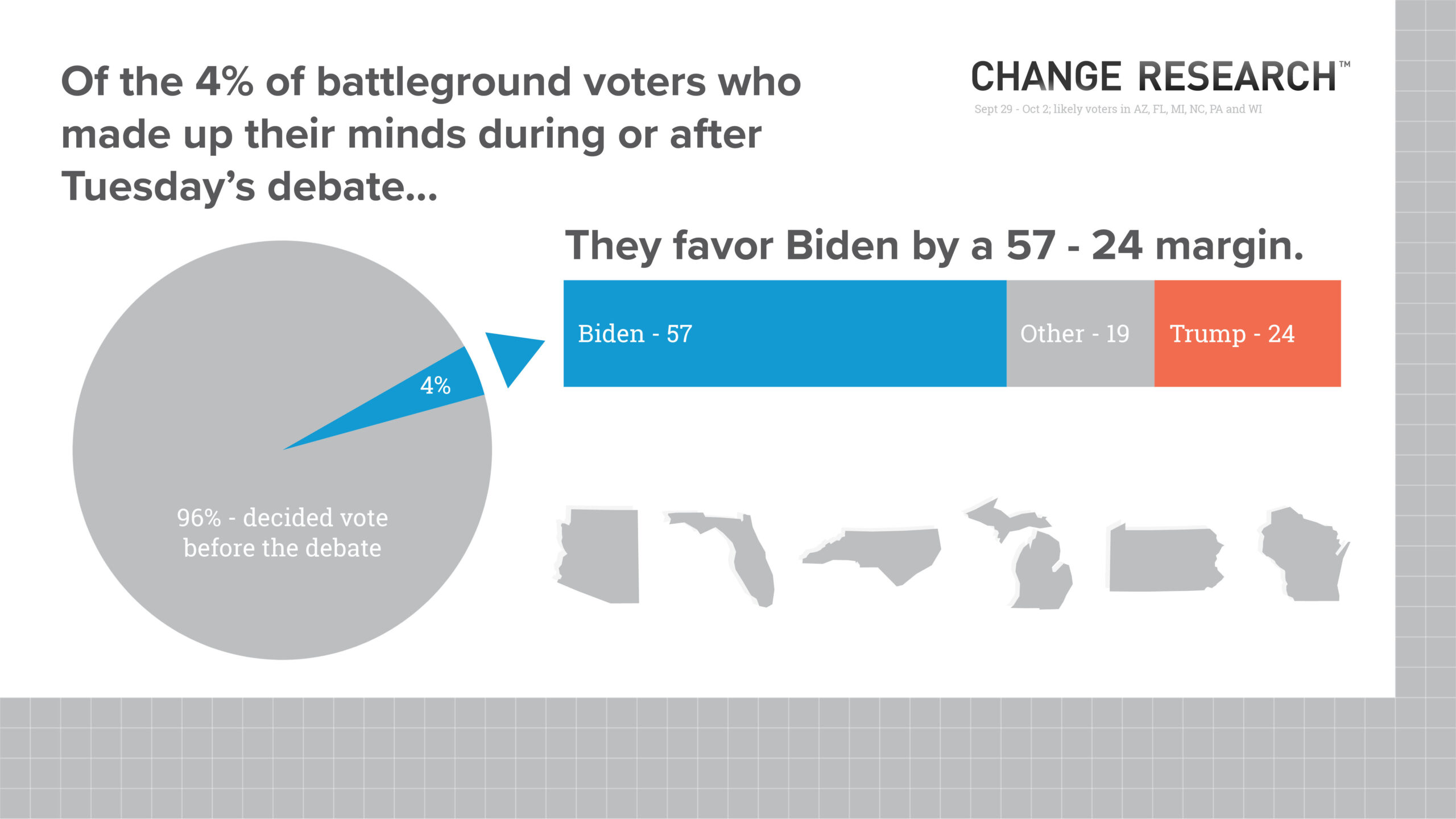Change Research Poll: September 29-October 2, 2020
Key Takeaways
A new survey of 2185 voters in six crucial swing states indicates that Joe Biden is handily winning the battle for undecided voters. Tuesday’s presidential debate has been the key driver of these recent deciders’ votes, playing a far greater role than any of the explosive stories that have dominated the news in recent weeks.
4% of voters in these six states (Arizona, Florida, Michigan, North Carolina, Pennsylvania, Wisconsin) made up their mind during or after the debate. These voters favor Biden by a 57-24 margin.

In an open-ended question about why recent deciders chose the candidate they did, Biden voters were primarily driven by Trump’s lies (19%), his failure to condemn white supremacists during the debate (15%), other points about his debate performance (13%), his COVID response (8%), and the Supreme Court (6%). No responses mentioned the story about Trump’s tax returns.
We oversampled voters who had indicated in a recent survey (since August 1) that they were undecided. Of this group, which was evenly divided in 2016, 20% voters now support Biden, 6% support Trump, 9% support third party candidates, and 65% have still not fully made up their minds. This finding adds further credence to the idea that Biden is currently faring considerably better than Trump in winning over undecided voters. 37% of these voters view Biden favorably or neutrally, while 28% have a favorable or neutral view of Trump. (The margin of error for this sliver of the electorate is +/- 11%).
“Stand Back and Stand By” Was The Debate’s Most Consequential Moment
Only 23% of those who saw any of the debate thought Trump had strongly condemned white supremacists. A majority of respondents, 53%, thought the “stand back and stand by” comment made it sound like he was their leader. 81% of undecided voters either thought his condemnation was weak or that it made him sound like he was their leader.
By a 50-34 margin, voters thought Biden did a better job at the debate. 26% thought Biden did better than expected, while 14% thought he did worse than expected. Only 10% thought Trump did better than expected, 44% worse. Among those who made up their minds during or after the debate, the divide was even sharper: 35% better / 9% worse for Biden, 8% better / 48% worse for Trump.
Voters were asked to choose an emoji that represented their feelings about the debate. The most commonly selected overall was ♀️, which was selected by 26% of respondents.
In Arizona, the most common was (25%)
In Florida, it was ♀️ (31%)
In Michigan, it was ♀️ (27%)
In North Carolina, it was ♀️ (22%)
In Pennsylvania, it was (30%)
In Wisconsin, it was (25%)
Among Trump voters, two of the top four emojis were and .
The Trump Story Has Politicized How Much People Paid In Taxes in 2016
72% of respondents said they paid more in federal income taxes in 2016 than the $750 Trump was reported to have paid (10% did not remember or were not taxpayers at that time). But only 59% of those who plan to vote for Trump say they paid more than $750, despite their incomes being similar to other voters’.
A majority of respondents believe that Donald Trump “made a lot of money in 2016 and 2017 but was effective at finding ways to pay less in taxes”; just 6% of voters believe that Donald Trump did not make much money in 2016 and 2017. Another 29% believe that the reporting around Trump’s taxes is inaccurate, and he in fact paid more than $750 in taxes. 15% are unsure.
Though the story may not have moved many votes, it does compound voters’ existing feeling that the wealthy are undertaxed. 65% of voters think the wealthy pay too little in taxes, including 50% who think they pay far too little. 79% of undecided voters think they pay too little, and even 25% of Trump voters think the same.
The story also shows that many voters do not think highly of Donald Trump’s skills as a businessman. Only 46% in these states think he’s a good businessman. 50% of swing state voters think Trump is a bad businessman–including 43% who think he’s very bad.
For media inquiries, please email [email protected]
Change Research surveyed 2185 registered voters in Arizona, Florida, Michigan, North Carolina, Pennsylvania and Wisconsin from September 29-October 2. The survey was conducted online, using Change Research’s Dynamic Online Sampling Engine. Post-stratification was done on age, gender, race, education, and 2016 presidential vote.
